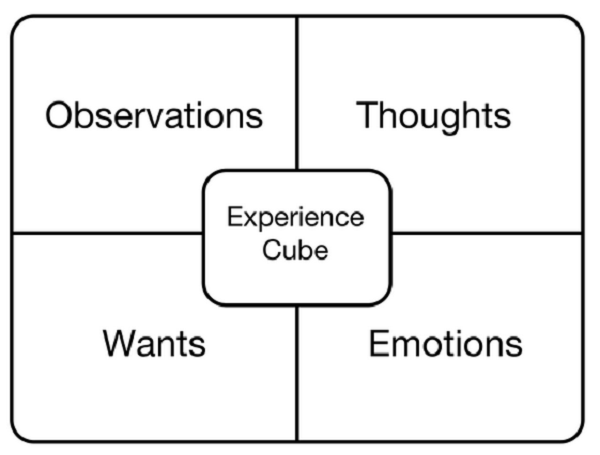Technique 1.121 Experience Cube (process of sense making)
Introduction
As a human being, you have an instinctive need to make sense of what is going on around. This can be achieve via stories
"...finding the truth is not as important to us as having a coherent story in our heads that we can tell ourselves to make sense of things..."
Elar Killumets, 2023
There are at least 3 levels of understanding you desire to make sense of:
i) global ( big picture; what is happening; how serious; how long will it last; mega-trends, etc)
ii) organisational (what are you customers and other relevant stakeholders doing?; what are the trends, especially in your market place?; are you thriving or just surviving?, etc)
iii) family (what is the family atmosphere at home?; how are your relatives going, etc?)
If you cannot make sense quickly, you become anxious. This can result in 2 errors
i) creating inaccurate stories (this will lead to incorrect decisions and action)
ii) speculation is worse than reality (this will increase your anxiety level)
NB In changing circumstances, more often than not our assumptions and guessing are both inaccurate and worse than reality.
With events developing at unpredictably rapid rates, it makes it almost impossible to predict the future with any degree of accuracy. However, you use your experience to try to perceive how the future will unfold, ie making sense the world around.
You need to be positive about opportunities, risks, etc.
Need to move away from the attitude of:
"...things happen to us, and we are not in control..."
Elar Killumets, 2023
to 'we are in control'.
Experience Cube
Much of your decision-making is automatic, ie below the level of conscious awareness. By using the Experience Cube you can make your decision making more conscious and/or explicit.
Your experiences can be divided into 4 elements (see diagram below):
i) observations (what you actually see, hear, etc)
ii) thoughts (what you believe is happening, etc)
iii) emotions (what you feel, etc)
iv) wants (what you want to happen, what you want to do, goals, etc)
Need to understand which quadrant you are in
"...all quadrants......are of equal importance. If we miss even one......it will result in wrong decisions and the potential victimisation of ourselves by ourselves..."
Elar Killumets, 2023

(source: Elar Killumets, 2023)
Sometimes people who are trained as rational thinkers are weak in the emotions quadrant.
In summary
"...Asking people to say what they personally observe, how they interpret it, and what they feel about it, and what is their plan of action..."
Elar Killumets, 2023
Making the explanation of your experience more subjective/personal and less objective/rational can make the verbal description more accurate and empowering, eg
| "...Examples of impersonal/ victim language |
Rewording to language that takes responsibility |
| This is a terrible thing happening in the world |
I am scared |
| Everything is screwed up |
I don't know what's going to happen |
| What about my job? |
I'm worried about how my family would cope if I lose my job |
| Why don't management tell us what's going on |
I will ask my manager what is going to happen, and make plans accordingly..." Elar Killumets, 2023 |
NB Humans are anxiety avoiders.
"...the problem with anxiety is that when it goes up, we want to get it down to normal levels as quickly as possible. In that state, most of the decisions we subconsciously make at that point are ineffective. They usually bring short-term relief (anxiety goes down), but they are harmful to us in the long term. They don't get us to where we really want to be..."
Elar Killumets, 2023
Questions for each quadrant
1. What do you see happening (what have you chosen from this vast body of information)?
2. How do you interpret it? What is your analysis and what are your assumptions? What do you believe is going on?
3. What do you feel?
3. What do you want to happen? What can you do?
Being aware of the language used and using the Experience Cube can be effective ways to reduce anxiety and give people emotional control over themselves.
"...The problem is still there. Be first emotionally ready to move on and act, and that is crucial. Because that is what people who take responsibility do - they act purposefully......they will help everyone involved to get more of what they want in any situation, thus regain control and readiness to act..."
Elar Killumets, 2023
Summary
"...the cube invites people to separate their experience of a situation from their potential judgement of it. As a result, people use the cube to become more self-aware and use specific language to articulate their point of view..."
Sally Patten et al, 2022
"...it is just a way to be very clear and explicit, so that you can explain and articulate what you want to tell the other person......you can use it as a feedback tool, or you can use it as a performance management tool, or you can use it as an opener for a conversation..."
Beny Furman as quoted by Sally Patter et al, 2022
